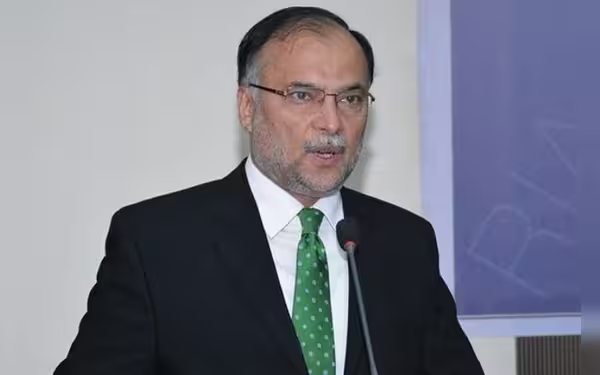Tuesday, December 3, 2024 04:44 PM
Ahsan Iqbal Calls for Education Reform in Pakistan
- Centralized control stifles educational progress.
- Urgent reforms needed for quality education.
- Teacher training is crucial for improvement.
 Image Credits: brecorder
Image Credits: brecorderAhsan Iqbal emphasizes urgent reforms in Pakistan's education system to enhance quality and integrity.
In recent years, the state of education in Pakistan has come under intense scrutiny. The Pakistan Education District Index Report has revealed alarming findings, indicating that none of the 134 districts surveyed meet the highest standards of educational quality. This situation has raised significant concerns among policymakers and educators alike, prompting calls for urgent reforms to address the shortcomings in the system.
During the launch of the Model Assessment Framework by the Inter-Board Coordination Commission (IBCC), Federal Minister for Planning, Development and Special Initiatives Ahsan Iqbal voiced his apprehensions regarding the centralized control of education in the country. He argued that such control has stifled progress and innovation, suggesting that decentralizing authority could empower districts to share best practices and foster healthy competition. “Centralized control has hampered progress; provinces must share best practices and create healthy competition to drive improvements,” he stated emphatically.
Iqbal emphasized the necessity of modernizing Pakistan’s education system to align with global standards. He articulated a strategic vision aimed at transforming the educational landscape, highlighting the importance of preparing the youth with the skills needed to thrive in a competitive global economy. “Our generation transitioned from slate to technology, and future generations will witness even more profound changes,” he remarked, underscoring the urgency of adapting to these shifts.
Under the government’s Vision 2025 initiative, comprehensive reforms are underway in curriculum and examination systems. These reforms aim to ensure a brighter future for students across the nation. Iqbal pointed out that teacher training is crucial for achieving quality education, announcing plans to establish a state-of-the-art teacher training institute in Islamabad. “Without investing in teacher training, quality education will remain a distant dream,” he cautioned, highlighting the pivotal role teachers play in shaping the educational experience.
Moreover, the minister called for a complete overhaul of the examination system, advocating for improved assessment methodologies to enhance educational standards. He announced the upcoming National Curriculum Summit, which will convene top education experts to align the curriculum with contemporary global needs. This initiative reflects a commitment to ensuring that students receive an education that is relevant and competitive on an international scale.
Addressing the issue of exam cheating, Iqbal expressed his concern over its detrimental impact on educational integrity. He posed a thought-provoking question: “If Cambridge University can conduct transparent exams globally, why can’t we?” This statement highlights the need for greater transparency and accountability in the examination process, which is essential for restoring trust in the educational system.
Furthermore, Iqbal introduced the Five Es Framework as a cornerstone of the government’s education reform strategy. This framework aims to ensure equitable access, enhanced quality, efficient governance, and empowered communities. He stressed the importance of fostering self-assessment skills among students and encouraged educational boards to adopt a culture of self-accountability. “The time for complacency is over. If we do not declare an educational emergency, we risk falling behind in the global race,” he warned, emphasizing the urgency of the situation.
The event served as a reaffirmation of the government’s commitment to transforming education through innovation, collaboration, and robust policy initiatives. As Pakistan navigates the challenges of modern education, it is crucial for all stakeholders—government, educators, and communities—to work together to ensure a prosperous future for the nation’s youth. The path forward may be fraught with challenges, but with a collective effort and a clear vision, there is hope for a brighter educational landscape in Pakistan.













